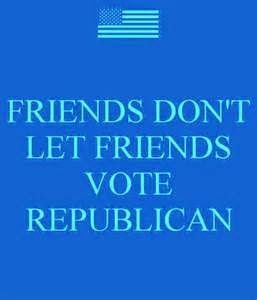The first one -- disbelief or even being agnostic on climate change -- should be enough to disqualify anyone from office. It is the single most critical issue of our time and you can't find one Republican candidate who is willing to admit the problem even exists much less willing to proffer a solution. A recent study found that 3% of current Republican members of Congress accept that climate change is real and caused by human beings. Think about that. Virtually every Republican in Congress and Republican hopeful refuse to accept the overwhelming consensus of the scientific community on climate change, often with the ridiculous refrain that they are not scientists themselves so how could they know. It really shouldn't be controversial to insist that our leaders rely on expertise in determining government policy. But I would venture that far more Republican members of Congress believe in the Biblical prophesy of End Times than they do in man-made climate change, and that's a big problem.
So what do they believe in? They believe the unemployed are lazy. They believe that terrorists are around every corner. They believe in deregulating Wall Street, and that all regulation is an anathema except when it comes to women's health. They believe that corporations are people too. They believe that advancing LGBT rights poses a threat to their way of life.
A sampling from a New York Times article on the rightward shift of GOP candidates is telling:
One nominee proposed reclassifying single parenthood as child abuse. Another suggested that four “blood moons” would herald “world-changing, shaking-type events” and said Islam was not a religion but a “complete geopolitical structure” unworthy of tax exemption. Still another labeled Hillary Rodham Clinton “the Antichrist.”Worried yet? Given demographics and gerrymandering, the House is sure to remain in Republican control for the foreseeable future. And without a late get-out-the-vote surge, it looks like the Senate may be in Republican hands for at least the next two years.
What would a Republican majority actually mean? Certainly we would have more gridlock, which if Republicans are passing bills would not be a bad thing. Whatever disastrous legislation reached the President's desk would thankfully get vetoed. On the other hand, Republicans would likely attach unacceptable riders to critical spending bills, creating even more chaos. Ezra Klein speculates that one thing that might pass is the Keystone XL pipeline, given its support among some Democrats. Not a problem, I suppose, if you don't believe in climate change.
With nothing better to do, we are sure to see more symbolic efforts to repeal Obamacare and, of course, the inevitable hearings on faux scandals. Can you say "Benghazi"?
An area in which a Republican Senate would make a significant difference is with Presidential nominations. While Obama in the past year has been successful in pushing through judicial nominations to fill vacancies and redress the imbalance in the judiciary caused by years of Republican intransigence, that would abruptly end. Most importantly, if a Supreme Court vacancy opens, Republicans would have the power to block any nominee who didn't meet their litmus test, which would be anyone to the left of Antonin Scalia.
So, even if you are a registered Republican, don't do it. Even if you aren't fond of your Democratic candidate, don't do it. Even if you believe in limited government, don't do it. Even if you oppose much of Obama's vision, don't do it. Voting Republican means voting for a dystopian world of ever-worsening environmental degradation, widening inequality with no safety net, more scandalous behavior from Wall Street and the prioritizing of fundamentalist Christian values for everyone. Don't do it.
What you must do, however is vote, and regardless of what the pundits say, this is a critical election. David Dayen has much more on why. And as he concludes:
The biggest stakes in this election concern what lessons will be drawn from it. It’s actually easy to call this a Seinfeldian election about nothing, because Democratic candidates have been so reluctant to stand for anything. They have offered little hope to a public made insecure by stagnant wages, soaring inequality and an economy insufficient to their needs. Implicit in this insecurity is the helplessness so many Americans feel about a political system that doesn’t seem within their grasp to affect, unless they have a spare billion dollars lying around.
When government fails for whatever reason, the perceived defenders of government suffer. And if those perceived defenders react by running away from any effort to use government levers to improve people’s lives, we will descend further into a Reagan-era miasma of market fundamentalism and corporate power.







0 comments :
Post a Comment